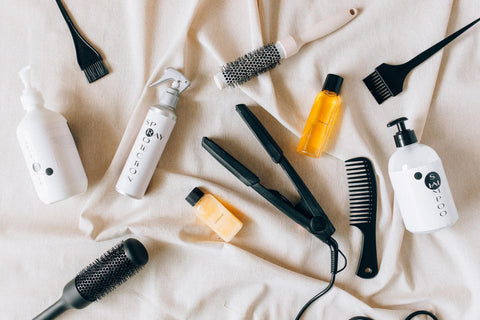Mastering Postpartum Hair Care from Baby Blues to Beautiful Looks
Postpartum hair loss, also known as postpartum shedding, is a common issue faced by many new moms after giving birth. The good news is that this is a temporary phase, and...
Postpartum hair loss, also known as postpartum shedding, is a common issue faced by many new moms after giving birth. The good news is that this is a temporary phase, and...


Hair fall is a common issue that many new moms experience after giving birth. It is known as postpartum hair loss. Hair goes through a phase of active, resting, and falling phase throughout life. During pregnancy, hormonal changes cause a reduction in hair shedding, resulting in thicker and fuller hair. However, hormone levels fluctuate after childbirth, and many hairs enter the falling phase, leading to increased hair fall. Here are some tips to manage postpartum hair fall:
Hormonal changes: Pregnancy hormones promote hair growth. After delivery, hormone levels return to normal, causing hair to shed. This is a temporary phase and should resolve on its own within a few months.
Be gentle: Avoid harsh brushing or vigorous towel-drying, as it can cause more hair breakage. Use a wide-toothed comb or a brush with soft bristles to minimize damage.
Choose gentle hair care products: Opt for mild shampoos and conditioners that are specifically formulated for hair fall or thinning hair. Avoid products containing harsh chemicals that could further weaken your hair.
Avoid heat styling: Minimize the use of hair dryers, straighteners, and curling irons, as excessive heat can damage the hair shaft and exacerbate hair fall. If you need to style your hair, use heat-protectant products and keep the heat settings low.
Eat a balanced diet: A nutritious diet rich in vitamins and minerals can support hair health. Include foods high in iron, zinc, vitamins A, C, and E, omega-3 fatty acids, and protein. Consult a healthcare professional or a registered dietitian for personalized advice.
Stay hydrated: Drinking an adequate amount of water is essential for overall hair and scalp health. Hydration supports hair growth and prevents dryness and brittleness.
Manage stress: Postpartum period can be stressful, and stress can contribute to hair fall. Engage in activities that help you relax, such as yoga, meditation, or taking short breaks for self-care.
Consult a healthcare professional: If you are concerned about the extent of your hair fall or if it persists for an extended period, it's advisable to consult a dermatologist or a healthcare professional who can evaluate your condition and provide appropriate guidance or treatment options.
Postpartum hair fall is a temporary phase, and most women see their hair returning to its pre-pregnancy state within six to twelve months. Remember, patience and self-care are key as you embrace this new chapter and find the best routine for your postpartum hair needs. Embrace this postpartum hair journey with confidence and love for yourself, knowing that these changes are a natural part of the motherhood experience. Give yourself grace and time as you navigate through this transition. Prioritize self-care, nourish your body from the inside out, and be gentle with your hair.
As you cherish those precious moments with your little one, don't forget to also cherish yourself and the amazing journey your body has been through. With a little patience and care, your hair will bounce back, just like your incredible strength and resilience as a new mom.
About The Author:
